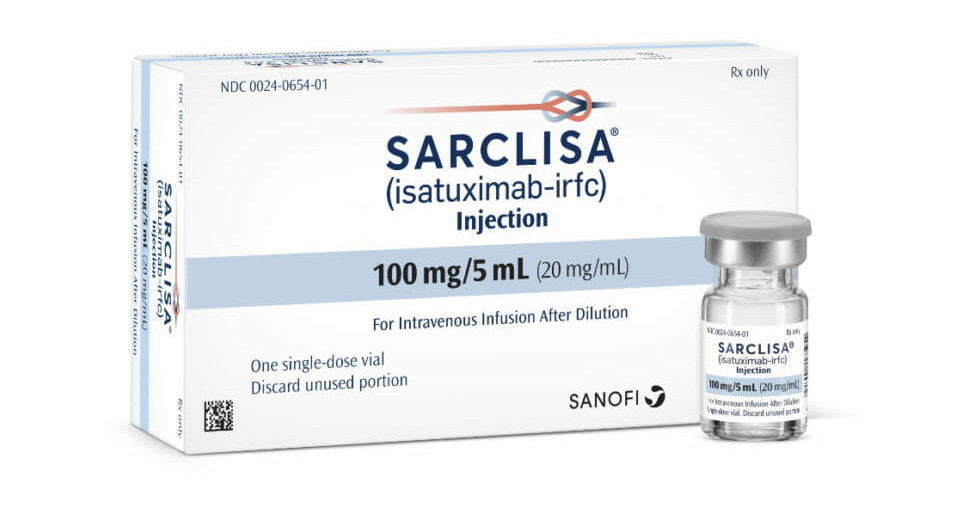Sarclisa (isatuximab) vs Talvey (talquetamab-tgvs)
Sarclisa (isatuximab) vs Talvey (talquetamab-tgvs)
Sarclisa (isatuximab) is a monoclonal antibody that targets a protein called CD38 on the surface of multiple myeloma cells, leading to their destruction, and is typically used in combination with other medications for the treatment of adults with relapsed or refractory multiple myeloma. Talquetamab (Talvey), on the other hand, is a bispecific antibody that binds to both GPRC5D on myeloma cells and CD3 on T-cells, bringing these cells into close proximity and activating the immune system to attack the cancer cells. When deciding between Sarclisa and Talquetamab, factors such as the specific characteristics of the disease, previous treatments, potential side effects, and the mechanism of action should be considered in consultation with a healthcare provider to determine the most appropriate treatment option.
Difference between Sarclisa and Talvey
| Metric | Sarclisa (isatuximab) | Talvey (talquetamab-tgvs) |
|---|---|---|
| Generic name | Isatuximab | Talquetamab-tgvs |
| Indications | Multiple myeloma (in combination with pomalidomide and dexamethasone, or carfilzomib and dexamethasone) | Currently under investigation for the treatment of relapsed or refractory multiple myeloma |
| Mechanism of action | CD38-directed cytolytic antibody | GPRC5D x CD3 bispecific antibody |
| Brand names | Sarclisa | Talvey |
| Administrative route | Intravenous infusion | Subcutaneous injection |
| Side effects | Infusion reactions, neutropenia, pneumonia, upper respiratory tract infection, diarrhea | Not fully characterized; being investigated in clinical trials |
| Contraindications | None known specifically; use caution in patients with severe hepatic impairment or severe renal impairment | Not fully characterized; being investigated in clinical trials |
| Drug class | Monoclonal antibody | Bispecific antibody |
| Manufacturer | Sanofi | Janssen Biotech, Inc. |
Efficacy
Sarclisa (Isatuximab) Efficacy in Multiple Myeloma
Sarclisa, known by its generic name isatuximab, is a monoclonal antibody used in the treatment of multiple myeloma. It is specifically indicated for adult patients who have received at least two prior therapies including lenalidomide and a proteasome inhibitor. Isatuximab works by targeting a specific protein found on the surface of multiple myeloma cells, known as CD38, and helps the immune system to attack and destroy these cancer cells. Clinical trials have demonstrated that when Sarclisa is added to a regimen with pomalidomide and dexamethasone, there is a significant improvement in progression-free survival compared to pomalidomide and dexamethasone alone. This combination has shown to reduce the risk of disease progression or death in patients with relapsed or refractory multiple myeloma.
Talquetamab-tgvs (Talvey) Efficacy in Multiple Myeloma
Talvey, with the generic name talquetamab-tgvs, is an investigational bispecific antibody that targets both GPRC5D, a novel multiple myeloma antigen, and CD3 on T cells. This dual targeting is designed to redirect T cells to kill multiple myeloma cells. While Talvey is still in clinical development and is not yet approved for use, early clinical trial results have shown promise. In these trials, talquetamab has demonstrated a manageable safety profile and encouraging efficacy in heavily pretreated patients with relapsed or refractory multiple myeloma. Patients in these trials have shown responses with reductions in myeloma protein levels, indicating a decrease in cancer activity.
Comparative Efficacy and Considerations
When comparing the efficacy of Sarclisa and investigational Talvey, it is important to consider that Sarclisa is an approved treatment with established clinical benefits, while Talvey is still undergoing clinical trials to determine its safety and efficacy profile. Sarclisa's efficacy has been validated in a randomized controlled trial setting, making it a reliable option for patients who have exhausted other treatments. On the other hand, Talvey's efficacy data is preliminary, but it represents a novel approach to multiple myeloma treatment that could potentially offer benefits to patients who have not responded to existing therapies.
Conclusion
In conclusion, Sarclisa has been proven to be an effective treatment option for patients with multiple myeloma who have received previous therapies. Its ability to improve progression-free survival offers hope for better disease management. Talvey, although not yet approved, shows potential as an innovative treatment that could expand the therapeutic landscape for multiple myeloma. As research continues, the efficacy and safety profiles of these medicines will become clearer, potentially offering new avenues for patients battling this challenging disease.
Regulatory Agency Approvals
Sarclisa
-
European Medical Agency (EMA), European Union

-
Food and Drug Administration (FDA), USA

-
Health Canada

Talvey
-
European Medical Agency (EMA), European Union

-
Food and Drug Administration (FDA), USA

Access Sarclisa or Talvey today
If Sarclisa or Talvey are not approved or available in your country (e.g. due to supply issues), you can access them via Everyone.org.
How it works

Make an enquiry
Choose the medicine you want to buy, answer a couple of questions, and upload your prescription to speed things up. We’ll get back to you within 24 hours.


Make an enquiry
Choose the medicine you want to buy, answer a couple of questions, and upload your prescription to speed things up. We’ll get back to you within 24 hours.


Breeze through the paperwork
We'll guide you through the required documents for importing unapproved medicine, ensuring you have all the necessary information.


Get a personalized quote
We’ll prepare a quote for you, including medicine costs and any shipping, administrative, or import fees that may apply.


Receive your medicine
Accept the quote and we’ll handle the rest - sourcing and safely delivering your medicine.

Some text on this page has been automatically generated. Speak to your physician before you start a new treatment or medication.
Let's talk
If you have any questions, call us or send us a message through WhatsApp or email:
Contact us




